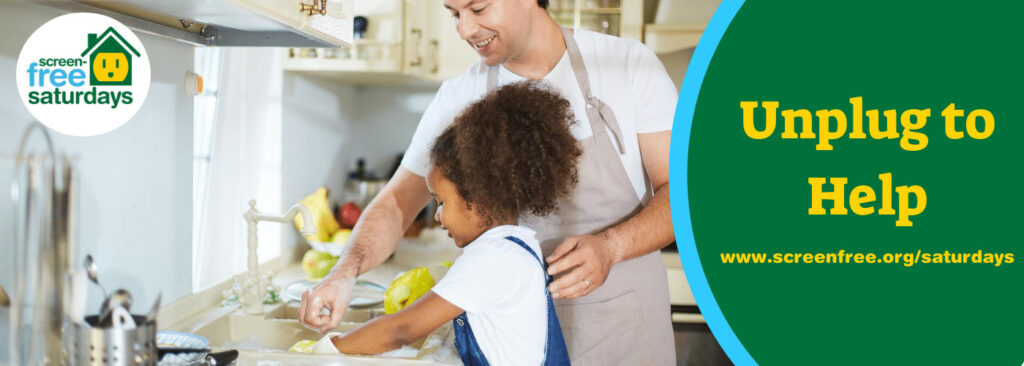Unplug to LookUp: A Screen-Free Saturdays Guide

In moments like this, it can be especially hard to unplug. Over the last three weeks, we’ve witnessed a historic movement for Black lives, all against the backdrop of a global pandemic. Staying informed is essential – but it’s also important to create space to reflect and decompress. Not only do we need it, but our kids do, too.
Our team at Screen-Free Saturdays acknowledges that we don’t have all the solutions. But we do know that technology is a huge factor in our mental health and relationships. So, this month, we’ve partnered with LookUp.Live to offer the LookUp Challenge in conjunction with our Screen-Free Saturdays for digital wellness, screen time management, and mental health while we all keep the momentum for social change going. Unplug to look within. Unplug to look around. Unplug to look for ways to help. Unplug to LookUp this month with the LookUp Challenge and Screen-Free Saturdays beginning July 18! MISSED THE CHALLENGE? CLICK ON THE LINK ABOVE TO SEE OTHER LOOKUP OPPORTUNITIES!
What is a LookUp Challenge? LookUp Challenges are just that: challenges for youth and adults to look up from their devices and to create balance in relationship to tech. They are generally led by young people thinking critically about their relationships with the media and have been done all over the country! These young people, for example, have been supported by LookUp to take on tech-life balance for themselves and their peers:
- Check out these 5 middle schoolers who challenged their whole school to think differently about their relationships with screens!
- Watch this panel on Gen-Z on tech-life balance during LookUp’s Innovator Showcase!
- And, check out these lessons by high schooler Haydn Wolfers who is using her passion for digital wellness to teach elementary schoolers in addition to hosting a LookUp club in her school!
Listening to Teens’ Stories about Screen Time
How often does bringing up screen time with kids cause a bigger battle than you expected? In many households, it’s most of the time. And, especially for parents of teens and young adults, the battle may feel like it’s already been won by your teen’s phone! But, when was the last time you actually sat down with the young people in your life to listen to their stories about screen time?
This month, we invite you to use your Screen-Free Saturdays to figure out how to help your kids become screen time ambassadors – to set boundaries with them, to understand the reality of their experience with tech, and to recognize how capable they are of setting an example for how your family can healthily exist with digital media. Here are a few tips for how to do that:
- Listen to your teen/young adult. I mean, really listen. Don’t rebut. Take it in. What do they enjoy about their devices? What do they believe are the benefits? What are the drawbacks? Many teens will tell you that they are overwhelmed by how many things they are expected to check and that they feel tired after too much scrolling. But, the solutions can’t always come from an adult. What solutions do they have for the drawbacks?
- Recognize the importance of social media right now. Many Black, non-Black POC, and White allies are using their social media accounts to uplift Black voices and to engage with an especially important moment in history. Help your kids process what they’re seeing and encourage them to post with purpose, taking breaks from the screen to try other types of actions or to engage in self-care.
- Recognize that we need skills to cope without a device. As CCFC volunteer Celine points out in her blog post, nomophobia (the fear of being without one’s phone) is real. And it’s real because, as digital natives, many young people depend on our phone for socializing, avoiding difficult feelings, or just to pass the time. Even as an older millennial, I have had panic attacks before answering a phone call that wasn’t pre-planned with a text. So, unplugging might be challenging – and that’s okay! Talk to your teen about what skills you can work on as a family to help to replace that crutch – maybe it’s simply finding a common place in the house to plug in. Offer lots of empathy and take it day by day.
- Provide kid-led examples of ambassadorship. There are so many young people out there who are figuring out how to live with tech better than adults- including parents, educators, and even experts! The examples from LookUp as well as our resources below offer some strong examples. Folks who use social media can follow @lookup_live for more about young peoples’ digital wellness movements.
- Live by example. Kids of all ages need their parents to walk the walk. Check yourself out loud. “Ugh, I just got so stressed when I checked my phone. I need to take a little walk. Want to come?” And don’t get offended if they say no!
Need more info? We recently hosted a webinar on tween/teen video game overuse, which can be watched here. And, check out our resource library for additional support.

Are you a nomophobe?
In a survey of her peers, our summer volunteer Celine Bernhardt-Lanier, a rising high school junior from Bethesda, Maryland, found that most high schoolers believed that their peers spent too much time on their phones, but didn’t think they had a problem themselves. So, she created a challenge to help them really disconnect.
Learn about Celine’s efforts to help her peers navigate tech in our latest blog.

Celling Your Soul
Celling Your Soul is the inspirational story of how a group of young college students learned to appreciate the power of authentic human connection. Listening to the stories of her students struggling to make the shift to digital socialization, communications Professor Joni Siani (also a Children’s Screen Time Action Network Advisory Board Member), empowered them with the skills and understanding that to get the feeling and fulfillment of emotional connection we all need. Now available to rent!
Community Connections
A recent study shows that when parents are stressed, kids’ screen time increases (as does parents’). And right now, we’re all feeling more stressed than usual, as we witness horrific anti-Black violence and even more police brutality in response to peaceful protests, all in the midst of a pandemic. Our devices – both kids’ and adults’ – are flooded with reminders of the brutal practices of police and deep-rooted, systemic injustices. Constant exposure to videos of violence against Black people, police brutality, and violence against protestors – even if only through a screen – isn’t good for adults, let alone children.
Yet, we need to stay in this fight. And dismantling 400+ years of systems that reinforce racism is not going to happen overnight. So, how do we take care of what our kids need from a developmental perspective, take care of ourselves (especially those on the frontlines) to make sure we don’t get burnt out, and maintain the energy and dedication needed to cultivate equity in our country?
There is no easy answer. But, what we can offer is an opportunity to build in self-care, grounding, and connection to keep us going for the long haul. We’ve also appreciated these resources to help us navigate the media in this moment:
Helping Kids Process Violence, Trauma, and Race in a World of Nonstop News and How White Parents Can Use Media to Raise Anti-Racist Kids from Common Sense Media
Talking to kids about George Floyd’s death and protests from Chicago Tribune
Teaching About George Floyd And Black Lives Matter from NPR
_______________________________________________________________________
We hope you’ll join us (and invite a friend) to our LookUp Challenge and to take the pledge for Screen-Free Saturdays! And if you can’t commit this month, see if there is a way that you can help someone else get the self-care they need in this time.
Happy unplugging,
Rachel




